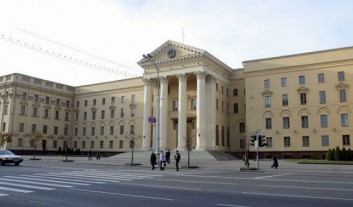KGB Head’s resignation points to difficulties with the law enforcement reform
 The situation has not changed
The situation has not changed

The KGB Head’s resignation following internal oversight weakens the government’s stability in the short-run. The situation is complicated by the fact that the security forces are controlled by President Lukashenko via semi-formal and newly created governmental agencies.
On November 9th, President Lukashenko held a public security meeting and dismissed the KGB Chairman Zaitsev. Acting KGB Chairman will be the Security Council State Secretary Maltsev.
Most likely, it was an emergency meeting at the Presidential Administration. The KGB Chairman’s resignation was unexpected, so as the appointment of Maltsev as Acting KGB head, who continues performing duties of the Security Council State Secretary. It is also evidenced by the fact that it was Maltsev, who publicly announced about the staff reshuffle, not President Lukashenko himself. Maltsev’s appointment indicates that Lukashenko had not enough time to agree to any other candidate.
Very little detail is known about Zaitsev’s resignation. According to Maltsev, the resignation was linked to the death of KGB Lieutenant Colonel Kozak in October and to other issues. Unofficial sources say Kozak, who allegedly controlled economic activity in the KGB, shot himself with a hunting rifle near his home. At the moment internal oversight is ongoing in the KGB to investigate the accident and the surrounding circumstances. The appointment of Malatsev as an “external controller” in the KGB, de facto means that Zaitsev’s deputies do not enjoy the President’s trust and therefore are isolated from the ongoing oversight, carried out by the Prosecutor’s Office and the Investigation Committee.
The incident should also be regarded in the wider political context. President Lukashenko has eventually been forced to respond to the dramatic increase in the KDB activity in Belarus. As we have repeatedly noted, after the establishment in 2012 of the Investigative Committee, the KGB’s influence in the law enforcement has substantially decreased, in the sphere of pretrial investigation in particular, and compensated with increased anti-terrorist and illegal migration activities.
In practical terms, this has resulted, in particular, in a sharp increase in cases of bombings in public places in cities and border areas, which, in turn, increased the public safety risks. The most recent cases were: an explosion near the Belarusian-Polish border on November 5th, ‘Molotov cocktail’ explosion in the Lithuanian embassy in Minsk on November 6th. All these developments point to the fact that the President is unable to carry out ‘soft’ reform in the law enforcement agencies. On the contrary, the ongoing reform exacerbates competition among the power structures, which has very specific negative consequences for ordinary citizens and ultimately undermines the image of the executive authority.
Clearly, Lukashenko himself is aware of this problem. Therefore, during the meeting, he intentionally highlighted the problems with the KGB staff and in particular elaborated on the issue of support from the retired law enforcers and about using their potential in the state security system. This issue is particularly relevant vis-à-vis the ongoing reform in the Interior Ministry, which experiences similar problems (frequent news about suicides among Belarusian policemen stopped shocking the population), and will face substantial staff-cuts.
However, in this difficult situation President Lukashenko is left with an extremely poor set of tools to bring the situation under control. First, it concerns formal tools, i.e. subordinate law enforcement agencies, and the newly established Investigation Committee in particular, which is still in its infancy stage. Second, it concerns a semi-formal deliberative institutions, foremost of which is the so-called “Top bras club”, a negotiation platform for the law enforcement management, established in 2011. On November 9th, Lukashenko said he intended to hold such meetings on security issues quarterly.
Since all of the above management tools have appeared in the past two years and have not been well established, current instability within the KGB objectively reduces the stability of the entire governmental system. On the other hand, the ‘divide et impera’ policy, which has long been carried out by Lukashenko in his subordinate clans, resulted in the situation when there are few political players in Belarus, who could benefit from this temporary instability. Moreover, after the parliamentary elections, Belarus has entered a two-year ‘apolitical’ period.
Subscribe to our newsletter




Situation in Belarus
Constitutional referendum: main consequences


 Video
Video
How to count the political prisoners: are the new criteria needed?


 Video
Video
Paternalism In Decline, Belarusian Euroscepticism, And The Influence Of Russia


 Video
Video












